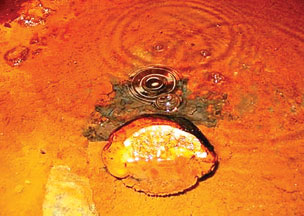Underground lake discovered after 2.7 billion years
Discovery could help in the development of techniques for finding
extra-terrestrial life-forms living within underground pockets of water
on the moons of Jupiter Scientists have discovered an ancient pocket of
water trapped deep beneath the ground which could have been isolated
from the rest of the world for up to 2.7 billion years - making it the
oldest known aquifer, with scientists wondering whether it contains
life.
The water was found pouring out of boreholes from a copper and zinc
mine 2.4 kilometres deep beneath Ontario in Canada. Chemical analysis
shows that the water could support primitive microbial life-forms if
they were adapted to living off the minerals and hydrogen seeping into
the water from the surrounding rock.
 Tests by researchers have shown that the water is at least 1.5
billion years old, but the surrounding geology suggests it could be much
older, dating to a time when all of life on Earth had not evolved much
beyond primitive, single-celled microbes. Tests by researchers have shown that the water is at least 1.5
billion years old, but the surrounding geology suggests it could be much
older, dating to a time when all of life on Earth had not evolved much
beyond primitive, single-celled microbes.
The scientists said they intend to analyse the water for signs of
life, which could help in the development of techniques for finding
extra-terrestrial life-forms living within underground pockets of water
on either Mars or Europa, one of the moons of Jupiter.
"We've found an interconnected fluid system in the deep Canadian
crystalline basement that is billions of years old, and capable of
supporting life," said Professor Chris Ballentine of the University of
Manchester, a co-author of the Anglo-Canadian study published in the
journal Nature.
"Our finding is of huge interest to researchers who want to
understand how microbes evolve in isolation, and is central to the whole
question of the origin of life, the sustainability of life and life in
extreme environments and on other planets," Professor Ballentine said.
The water has a similar composition of dissolved chemicals to much
young water found flowing from rock in a South African mine some 2.8km
below ground where microbes have been found to live, the scientists
said. Any life-forms found in the water must be able to survive in total
darkness on chemical energy locked up in the ancient rock formation.
Scientists have begun tests to analyse the water for any microbes that
have survived the long isolation from the rest of the biosphere, said
Greg Holland of Lancaster University."Our Canadian colleagues are trying
to find out if the water contains life right now. What we can be sure of
is that we have identified a way in which planets can create and
preserve and environment friendly to microbial life for billions of
years," Dr Holland said.
"This is regardless of how inhospitable the surface might be, opening
up the possibility of similar environments in the subsurface of Mars,"
he said.
Living organisms that can survive in extreme environments - known as
extremophiles - have been found in sediments retrieved from deep
boreholes, in boiling hot geysers, highly radioactive habitats, deep
submarine trenches and the dry, freezing deserts of Antarctica.
- The Independent |


